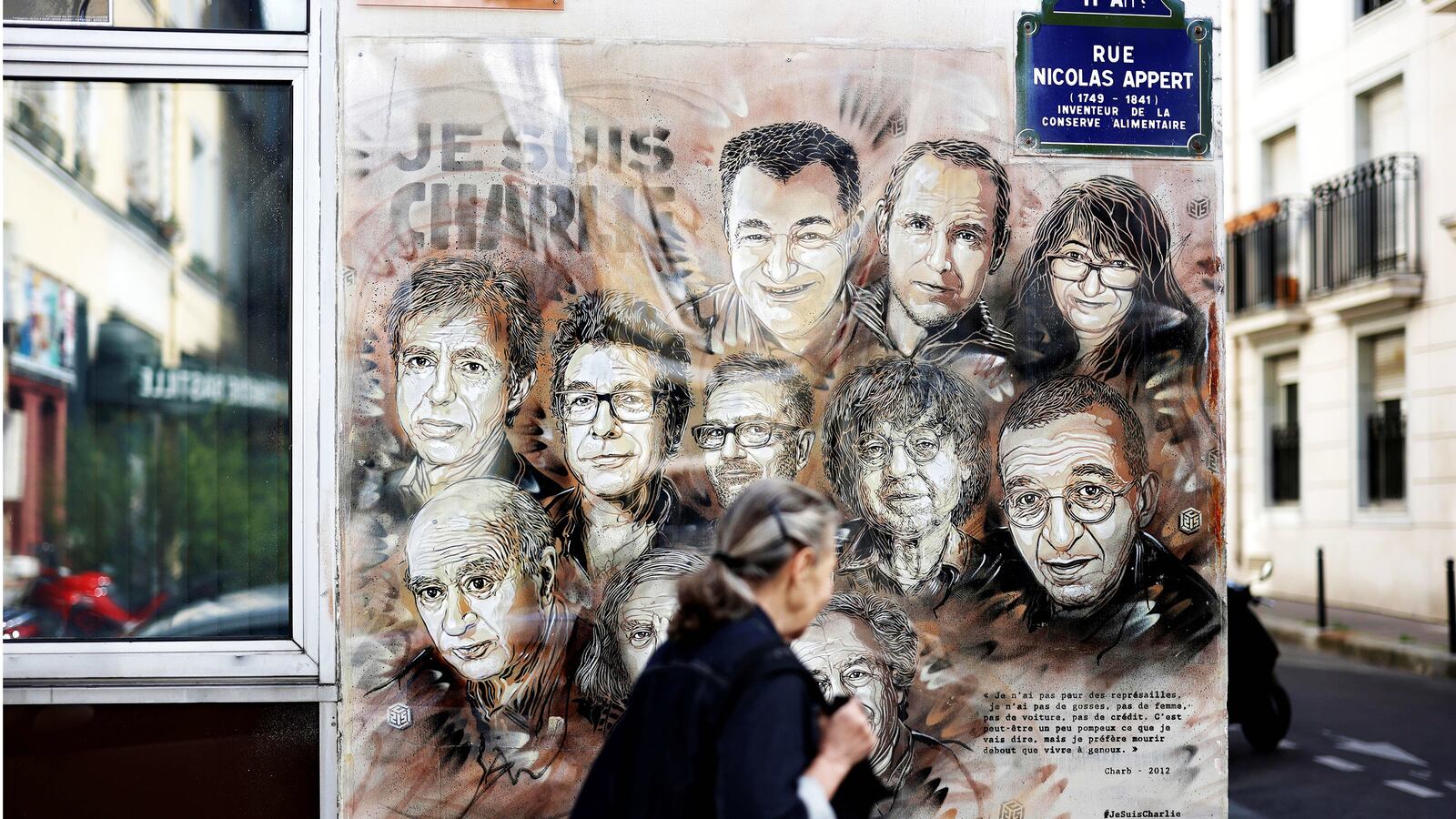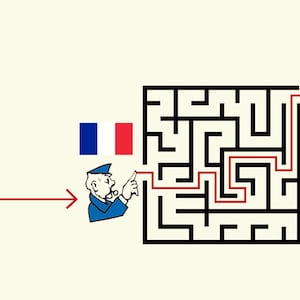PARIS—In the first week of the Charlie Hebdo terror trial, it’s hard to find solace for any party involved. The terrorist attackers themselves are dead. The survivors and families of the victims—-living in fear and agony ever since—will sit through 10 weeks of details and denials of the twisted terror plots. These suspects have already been found guilty in the court of public opinion—and yet most of them are just minions and losers, whose chance of a fair trial is questionable.
One by one the handcuffed suspects were ushered into the unforgiving setting of the main courtroom here in central Paris. They were brought to their seats in two glass boxes with steel frames that look awkwardly similar to those seen in Russia’s show trials. With them in the box, is a cluster of police officers from the terror squad, wearing flak jackets and balaclavas. Each suspect is seated slightly apart from the next, a police officer standing right behind them. The suspects, who are also masked due to the coronavirus pandemic, are mainly young and most are from Paris’ ‘banlieues,’ the poor, demoralized suburbs of the capital, or the desperate northern French town of Charleville-Mézières, or Gilly in Belgium, where unemployment is rife and petty crime is commonplace. Calmly, resignedly, they await their turn to be heard.
The facts in the cases are well-known; on the morning of Jan. 7, 2015, the Kouachi brothers, Cherif and Saïd, forced their way into the Parisian offices of the satirical magazine Charlie Hebdo, which had printed a series of cartoons mocking the Prophet Muhammad. They rushed past the front desk and embarked on an horrific killing spree, murdering 12 people and leaving 11 wounded. Al Qaeda of the Arabian Peninsula (AQAP) claimed the attack two weeks later and added that “it had been planned for years,” by Anwar-al-Awlaki the infamous al Qaeda figurehead killed by a CIA drone strike in 2011.
One day after the attack on Charlie Hebdo, a man called Amedy Coulibaly executed his own murderous plot, killing a female police officer in Montrouge, a Parisian suburb.
An unprecedented third day of violence, which had the world glued to 24-hour news channels, erupted when the brothers were engaged in a shoot-out with cops and Coulibaly began a siege in HyperCacher, a kosher supermarket where he murdered another four men. Coulibaly pledged alliance to the so-called Islamic State.
The Kouachi brothers and Coulibaly were killed on Jan. 9, 2015. Five years later, the men now on trial are said to be their facilitators. They allegedly arranged their safe houses and vests, their rocket launchers, tasers, Kalashnikovs and knives. Because both cases are linked, the trials are taking place together.
In France, the spotlight is intense. The wounds of this attack—and the coordinated attacks on Paris including the Bataclan theater later in the same year—have yet to heal, and the issues are still bitterly contested.
When lawyers for one of the victims linked a suspect’s Muslim faith to jihadism, his lawyer leapt in. “France is a secular country,” she said, “We shouldn't be arguing his religion.”
The legal team representing the victims could not control themselves. “How dare you?” one defense lawyer shouted, clearly upset. “With the victims here, present in this room!”
The defense lawyer in question was Isabelle Coutant-Peyre, she is infamous in her own right; best known for defending Carlos the Jackal and then marrying him.
Carlos the Jackal, whose real name is Ilich Ramirez-Sanchez, committed several terrorist attacks in the ‘70s and ‘80s for the militant wing of the Marxist Popular Front for the Liberation of Palestine (PFLP). He was convicted of 16 murders and linked to many more. Coutant-Peyre embraces an almost anarchist stance, claiming there is never a fair trial for those charged with terrorist offenses.
There is no doubt that the array of terrorist attacks unleashed in France since January 2015, which killed 258 people, has caused a collective trauma and left deep scars. Many agree that a fair trial for the 13 men and one woman on trial over the coming weeks is almost impossible.
“Giving terror suspects a just trial is a true test of the judicial system.” Elpiniki Kolokatsi, a criminal lawyer attending the trial, told The Daily Beast.
Kolokatsi is part of the legal team representing Dutch women in Syrian refugee camps who want to return to Europe after traveling to the Islamic State. Kolokatsi said the fairness of the trial had been damaged well in advance when files were leaked to the press.
“It’s objectionable and incomprehensible,” she said. “To leak investigation files is illegal and clearly against the interests of the suspects and their right to presumption of innocence.”
The ramifications of the case continue to be felt all over the world. Iran condemned Charlie Hebdo last week for republishing of the Mohammed cartoons on the day the trial began. This new issue features a weeping prophet on the cover. “It's hard to be loved by assholes,” he says. “All this for that,” it reads in big bold yellow letters, all that bloodshed for a few cartoons.
The formal architecture of the Paris Tribunal—a stack of four giant glass rectangles by Renzo Piano—betrays little of the drama that is unfolding inside, although there are rows of dark blue police vans filled with anti-terror police lining the side streets.
Center stage, like a flock of crows, are the 94 lawyers involved in the process, in their black robes and white bands. All are masked. Lifted slightly above the crowd are the chairs of the five judges. The presiding judge, Regis de Jorna, dressed in bright red velvet robes trimmed with black and white fur, sits in the center.
The air in the courthouse is filled with anticipation—but there is also the occasional whiff of disinfectant. The coronavirus looms heavy over the court proceedings. The mandatory masks hide most feelings, including those of the accused. Only the eyes can betray emotions, all other detail gets lost behind the pieces of cloth. After a lengthy debate the first two days of the trial, the judges have allowed people testifying to drop their masks.
The main suspect being tried in person is Ali Riza Polat, who is facing a life sentence for his alleged role in supporting both the attacks on the Charlie Hebdo staff, as well as the terror plot on the kosher HyperCacher supermarket.
The other 10 suspects present are charged with crimes varying from weapon sales to logistical support. Allegedly, they traded illicit goods for arms used in the attacks; arranged for safe houses; aided; and abetted.
Hayat Boumedienne, the widow of Coulibaly, is the only female suspect on trial, she is being tried in absentia for financial complicity in the attack on Charlie Hebdo and the HyperCacher supermarket. The two others being tried in absentia, Mohamed and Mehdi Belhoucine, are both presumed dead, killed on the battlefields of Syria and Iraq. All three left to join the Islamic State, but Boumedienne is the only one still believed to be alive in Syria. Her sister Kaltoum Boumedienne, who testified on Friday afternoon, last received a telephone call from her sister in October 2019. Since then, all contact has been cut off.
The supposed mastermind, Peter Cherif, aka Abu Hamza, is not part of the line-up. He was apprehended in Djibouti in December 2018, handed over to French authorities and remains in custody awaiting a separate trial.
Of all the charges that have been brought against the 14 on trial, the heaviest are against Mohamed Belhoucine and Ali Riza Polat, a man of Turkish-Kurdish descent who was an important player behind both attacks, according to the French public prosecutor.
His charge sheet reads ‘complicity to terrorist murder,’ a crime punishable by life without parole in France. The others stand trial for the lesser charge of ‘complicity to criminal terrorism’ and are facing a maximum of 20 years in prison. Only one suspect, Willy Prevost, risks a minor 10 year sentence.
When Polat stood up to speak on Friday—a shaven-headed, chubby 35-year-old in a white shirt and sand-colored trousers—he said: “This has gone too far, they lie, they surprised me, but I will explain myself.”
During questioning he never took off his mask. Defiant, arms crossed, he stood behind his microphone.
This part of the trial is reserved for something called ‘personality questioning.’ The judges, prosecutors and defense lawyers can question the suspects, but only to find out more about their backgrounds. “I started dealing cannabis when I was 17,” Polat told the judge. In 2009 he was jailed for the first time; “In prison there were people who had lots of money, and were hardly doing any time. I thought ‘I want more,’ that’s what I’ve learned in prison: I want to die rich, not poor.”
As his criminal career advanced, Polat started shipping heroin from Lebanon and Turkey, earning him $120,000 per kilo. That was one business, the other was his arms trade. He claimed he's simply a criminal opportunist, driven by money, nothing more.
One of the victim’s lawyers said: “In 2015, you told a female prison guard: ‘You know Charlie Hebdo? I'll do the same to you.’” Polat sharply denied it. “Lies”, he said. Sure, he knew Coulibaly, but he knew nothing of any terror plans.
Next week, the plight of the victims and the families of the deceased will be heard. Many will testify, but how much satisfaction can they derive from the trial?
“I don't expect much,” Maryse Wolinksi told France 24. Her husband, George Wolinski, was one of the founders of Charlie Hebdo and died in the attack. “It's the intermediaries who will be judged here. It's their trial, not the trial of the attack… We will not find out why the attack took place.”
An article in Charlie Hebdo published after the first days of the trial asked a fundamental question: “Are we being taken for a ride, or are we giving our time, our ear, to little lost bandits that have nothing to do with the horror in our heads?”
It could be that this kind of terror trial is about something else entirely, as author Yannick Haenel suggests: “The big thing may be... to get the chance to question. Thát is what is called justice. And it is unfolding in front of us.”







